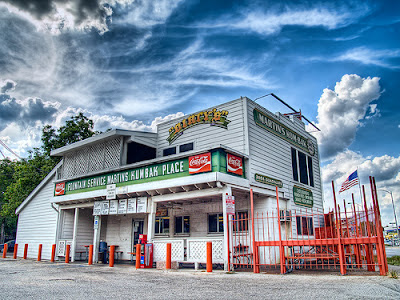Per the Travis Tracker; Project Connect claims first victim: century-old campus diner Dirty Martin's
It may have been only a matter of time in Austin's ever-changing economic climate. But the passage of a recent light rail expansion bond may have greatly accelerated the demise of one of the places that claims to be "Austin's oldest restaurant."
Dirty Martin's Place, open since 1926 and originally known as Martin's KumBak (earning its nickname due to its earlier lack of flooring) is apparently in the way of the Orange Line of Project Connect. It has remained a hot spot for adjacent University of Texas students for the entire time, and maintains an outdoor garden area popular in the evenings.
Manager Daniel Young, via a forum dedicated to Austin's many past-and-present greasy spoons, confirmed rumors the establishment had received an eminent domain letter from the city:
"We’re going to fight the city on this, but need your support! .... We’re going to be starting a petition asking the city to keep the light rail underground from MLK to 38th St. Save Dirty’s."
The Tracker reached out to Young for further comment. The location and length of the planned tunnel is undetermined.
Project Connect, approved in a 2020 bond election, aims to build upon the city's existing north-south Red Line train route by laying down $7.1 billion in five new rail lines, digging a downtown transit tunnel, and expanding express buses designed to augment the rail system.
The tax rate of 53 cents per $100 worth of property valuation went into effect last year. The Council-approved ballot language was surprisingly flowery, promising the taxpayer money would go to "address traffic congestion, expand service for essential workers, reduce climate change emissions, decrease traffic fatalities, create jobs, and provide access to schools, health care, jobs and the airport; to include neighborhood supportive affordable housing investments along transit corridors and a fixed rail and bus rapid transit system, including associated road, sidewalk, bike, and street lighting improvements, park and ride hubs, on-demand neighborhood circulator shuttles, and improved access for seniors and persons with disabilities." (Translation: if you vote "no," you're a monster.)
It passed 58-42% on the 2020 presidential election ballot. The city of Austin projected an increase of $332 per year for the median property taxpayer. Nothing was said, however, of the loss of iconic businesses located along the routes.
A mixture of federal funds and grant money will also support the massive alternative transit project.
Hat-tip to Jennifer Virden, a candidate for Austin mayor, for sounding the alarm this evening.

Comments
Post a Comment